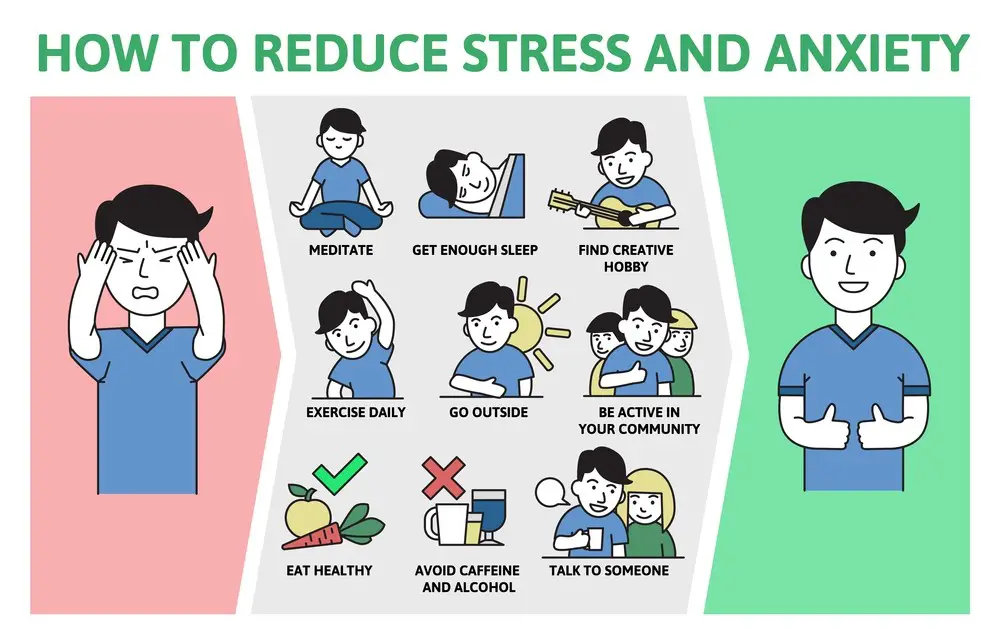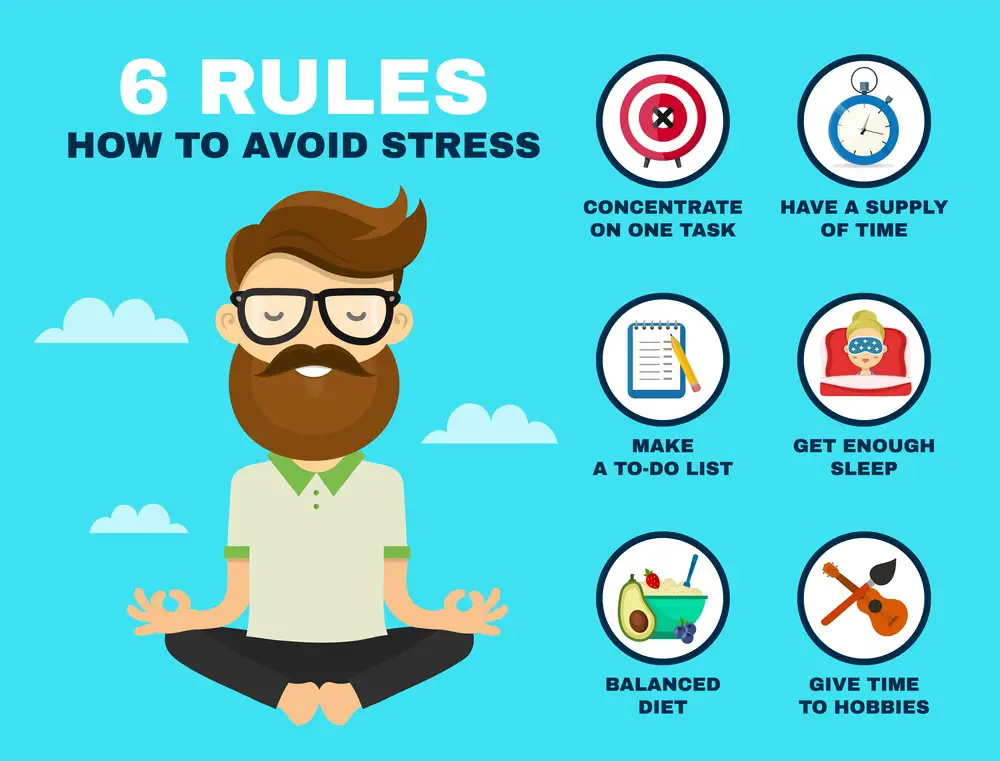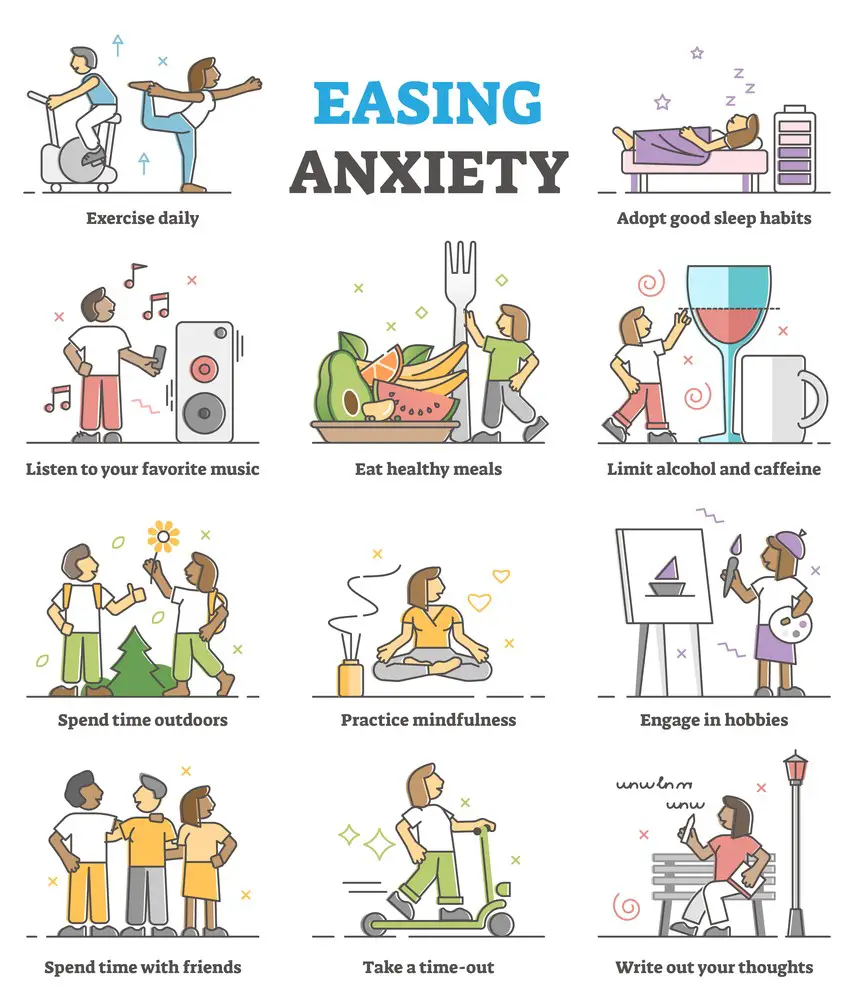As a BetterHelp affiliate, we receive compensation from BetterHelp if you purchase products or services through the links provided
Stress can creep into your life for various reasons, ranging from an overwhelming workload to relationship issues. It’s a natural response designed to help you cope with challenges, but when stress becomes chronic, it can trigger a ripple effect across various aspects of your health and well-being. Its physical manifestations may include headaches, muscle tension, fatigue, and sleep disturbances. These symptoms reveal your body’s immediate reaction to perceived threats and pressures, reminding you that it might be time to slow down and recalibrate.
On top of physical discomfort, stress can cast a shadow on your mental state, leading to anxiety or depression. It’s as though your mind is trying to juggle too many thoughts simultaneously, leaving you overwhelmed and emotionally drained. This emotional turmoil can also spill over into your social life, potentially straining your relationships and making it harder to connect with others. At work, high levels of stress can blunt your productivity, turning everyday tasks into mountains rather than molehills.
Discovering effective coping mechanisms is essential to managing stress and protecting your long-term health. It’s not only about alleviating the current tension but also about developing resilience for the challenges ahead. By understanding your stress triggers and recognizing the early signs of stress overload, you can take proactive steps to maintain your equilibrium.
Key Takeaways
- Chronic stress can have physical symptoms like headaches and fatigue.
- Feelings of overwhelm and relationship tensions may indicate emotional stress.
- Coping strategies are crucial to alleviate stress and improve long-term health.
Physical Effects of Stress
 When you’re under stress, your body reacts in ways that can affect your overall health. Here’s how:
When you’re under stress, your body reacts in ways that can affect your overall health. Here’s how:
- Headache: You may notice your head throbbing when the pressure mounts.
- Muscle tension and pain: Stress can cause your muscles to tense up, leading to discomfort.
- Chest pain: Feeling stressed might bring uncomfortable pressure in your chest.
- Fatigue: It’s common to feel unusually tired because your energy is depleted.
Your heart and blood vessels also take a hit:
- High blood pressure: Stressful situations can cause your blood pressure to spike temporarily.
- Heart disease: Chronic stress can contribute to issues like heart disease over time.
- Stroke and heart attack: Prolonged stress may increase the risk of these severe events.
Your body’s regulatory systems can go haywire:
- Sleep problems: Stress might keep you awake at night, leading to insomnia.
- Immune system: You’re more susceptible to colds and infections under constant stress.
- Digestive issues: You might experience heartburn, nausea, or changes in appetite.
Hormones play a role, too:
- Cortisol levels: Stress increases cortisol, which can have detrimental effects if consistently high.
Breathing, skin, and gut reactions:
- Rapid breathing and asthma: Stress can make you breathe faster or even trigger asthma attacks.
- Skin reactions: Hives, eczema, or psoriasis can flare up due to stress.
- Digestive upset: You might encounter diarrhea, constipation, or even ulcers.
Inflammatory responses become more pronounced:
- Inflammation: Stress can lead to increased inflammation, exacerbating conditions like arthritis.
- Inflammatory bowel disease: Conditions like Crohn’s or ulcerative colitis may worsen.
Key Takeaway: Your body’s response to stress can manifest in numerous physical symptoms, affecting everything from your muscles to your mood. Acknowledging the signs early and finding ways to manage stress can help safeguard your health.
Mental Impact of Stress
 When you’re faced with stress, it’s not just your mood that can suffer. Your entire mental state can be affected. Here’s how:
When you’re faced with stress, it’s not just your mood that can suffer. Your entire mental state can be affected. Here’s how:
- Anxiety: It’s common to feel anxious when stressed. Your mind races as worry takes the driver’s seat, affecting your day-to-day activities.
- Depression: Prolonged stress can lead to feelings of hopelessness or deep sadness, making it hard for you to find enjoyment in life.
Stress doesn’t play fair with your cognitive functions either:
- Focus: Finding it hard to concentrate? Stress might be scattering your thoughts, making focusing a challenging task.
- Memory Problems: Remembering details becomes tough when stress hormones are running high. It’s like they’re throwing a wrench in your mental gears.
Let’s talk about mental health overall. Chronic stress has the power to disrupt your mental equilibrium, overwhelming you and sometimes leading to a persistent gloom that’s tough to shake off.
- Irritability: Little things can suddenly feel infuriating, right? That’s stress turning up the dial on your irritability.
- Mood Changes: One minute, you’re up, the next, you’re down. Stress hormones act like a seesaw for your mood.
But why does this happen? Stress triggers a cascade of hormonal reactions in your body. It’s like flipping a switch on your nervous system, alerting your body to prepare to either fight or take flight. Unfortunately, when this system is constantly engaged, it wears on your mental state.
Key Takeaway: Your stress isn’t just ‘in your head’—it can manifest in a variety of mental health issues. Recognizing the impact can help you take the first step toward managing stress better.
Emotional Consequences of Stress
 When you’re under a lot of stress, it can feel like you’re carrying a heavy emotional backpack. Your mood can dive, and you might feel unusually angry or irritable—picture stress as a squall stirring up in your mind, sometimes casting a shadow over your day.
When you’re under a lot of stress, it can feel like you’re carrying a heavy emotional backpack. Your mood can dive, and you might feel unusually angry or irritable—picture stress as a squall stirring up in your mind, sometimes casting a shadow over your day.
Emotional Symptoms:
- Feeling overwhelmed, as if just one more demand could tip the scale.
- Irritability causes friction in interactions that usually flow smoothly.
How Stress Impacts Mood:
Your usual cheery self may feel distant. You’re not alone in this; it’s a common side effect of enduring too much pressure without pause.
Stress and Relationships:
- Engaging with loved ones: Stress might make it harder to communicate effectively.
- Nurturing connections: A frazzled state can strain the bond with those you care about.
Managing Stress Before It Manages You:
- Take a moment to breathe and step back from the situation.
- Create a routine that incorporates relaxation and self-care.
- Connect with friends and sharing your struggles may lighten your emotional load.
Key Takeaway:
Remember, it’s okay to ask for help. You’re not expected to handle everything on your own. Finding stress management techniques that work for you can brighten your mood and improve your relationships.
Relationship Strain Due to Stress
 Stress can place a heavy burden on your relationships. When you’re feeling overwhelmed, it’s natural for your patience to run thin, which can lead to conflicts with those closest to you. Let’s break down how stress can impact the dynamics of your relationships:
Stress can place a heavy burden on your relationships. When you’re feeling overwhelmed, it’s natural for your patience to run thin, which can lead to conflicts with those closest to you. Let’s break down how stress can impact the dynamics of your relationships:
- Expectations vs. Reality: You might notice that your responsibilities seem heavier under stress, and meeting the expectations of partners, family, or friends feels daunting. Remember, it’s okay to express when you’re reaching your limit.
- Uncertainty and Coping: Stress often brings a sense of uncertainty, making it challenging to plan or look ahead with confidence. Find coping strategies that work for you, like mindfulness or exercise, to help ease your mind.
- Emotional Symptoms: Emotional symptoms like irritability or sadness can surface with stress. These feelings might cause tension without you even realizing it, as your loved ones may not understand the source of your mood.
- External Factors: Consider the external factors that add to your stress. Is work pressure spilling over into your home life? Identifying these can help you address the root causes.
Key Takeaway: To maintain healthy relationships amid stress, communicate openly about your feelings and challenges. This transparency helps manage mutual expectations and fosters understanding. Admit to yourself when things are tough, and don’t shy away from seeking support, whether from loved ones or professionals.
Productivity Decline from Stress
It’s like having a fog in your brain when you’re stressed. Your focus wanes, and tasks that once seemed straightforward now loom large and complex. Your motivation might take a hit as well. If you’ve noticed a change in your ability to churn through your workload, stress might be the uninvited guest at your work desk.
- Focus: Stress hampers your concentration. You might find it challenging to pay attention to tasks or details.
- Motivation: The overwhelming stress often zaps the drive you need to start or complete your work.
Experiencing high levels of anxiety can make you feel like you’re constantly in a state of fight-or-flight, robbing you of your usual problem-solving abilities. When depression tags along with stress, it’s not just a bad day—it’s a series of days where even getting out of bed feels daunting.
- Health Problems: Extended periods of stress can lead to health issues, such as headaches or stomach problems, which may cause you to take more sick days.
- Overwhelm: The sense of being overwhelmed can make it hard to prioritize tasks or adapt to change at work, resulting in decreased productivity.
The link between stress and your productivity is clear. You’re not just imagining it—stress has a tangible effect on how much and how well you can work.
Key Takeaway: Reducing stress isn’t just about feeling better; it’s about working better, too. Simple strategies like taking short breaks, practicing deep breathing, and setting realistic goals can help safeguard your productivity.
Coping Mechanisms for Stress
 Managing stress is crucial for your well-being. A wide array of techniques can help:
Managing stress is crucial for your well-being. A wide array of techniques can help:
- Exercise: A brisk walk or a steady gym routine does wonders for releasing tension.
- Relaxation techniques: Activities like painting or gardening can calm your mind.
- Deep breathing: Slowing your breath down brings a sense of peace.
Incorporating meditation and yoga into your routine can enhance your resilience to stress. These practices focus on mindfulness and body awareness, helping you to center yourself when things get hectic.
Laughter is a powerful antidote to stress. Cultivating your sense of humor, watching a funny movie, or sharing jokes can lighten the emotional load.
Music has a unique ability to soothe; creating playlists with your favorite calming tunes is a great strategy to unwind.
Your diet is your fuel. A healthy diet with plenty of fruits, vegetables, and whole grains can stabilize your mood and energy levels.
Taking time for activities you love, like reading or engaging in hobbies, provides a necessary break from the pressures of life.
Remember, effective stress management is about finding what works for you, whether resilience-boosting exercises or peaceful meditation sessions. Your approach to coping will be as unique as you are.
Key Takeaway: Mix and match these practices to find your personalized toolkit for stress relief.
Long-term Health Risks of Stress
Chronic stress can be pretty sneaky. It doesn’t just feel bad in the moment; it might also be shaking hands with your long-term health behind your back. When stress becomes a constant companion, it can raise your blood pressure, and high blood pressure is not something to take lightly. It can lead to heart disease, the kind that increases the risks of stroke and heart attack. And let’s not even get started on how it can contribute to diabetes – another unwanted guest in the health department.
The Body’s Reaction
- Stress hormones, like cortisol and adrenaline, flood your system.
- Blood pressure spikes.
Impact on Health
- Heart disease: Stress can damage arteries over time.
- Stroke: High blood pressure may cause blood clots in the brain.
- Heart attack: Stress increases the chance of heart conditions.
- Diabetes: It might affect the way your body handles sugar.
Reproductive health also gets an invite to this unwelcome party. Stress can lead to issues that might make conception more challenging.
Less-known Effects
- Changes in reproductive health.
- Persistent imbalances in stress hormones.
But it’s not all doom and gloom. Being armed with knowledge means you can take steps to manage stress and protect your health. Remember, your body listens to your mind, so take a deep breath and cherish those calm moments.
Key Takeaway: Keep an eye on your stress levels; it’s more than just a mood killer – it’s a health protector.
Tips for Managing Stress
 Managing stress is crucial for your overall well-being. Here are some friendly suggestions to keep stress at bay:
Managing stress is crucial for your overall well-being. Here are some friendly suggestions to keep stress at bay:
- Exercise: Incorporate physical activities like walking, running, or yoga into your daily routine. Not only does exercise release endorphins (your body’s natural stress relievers), it also helps in building resilience.
- Diet: What you eat matters! Aim for a balanced diet rich in fruits, vegetables, lean proteins, and whole grains. These foods can improve your mood and energy levels.
- Sleep: Prioritize getting 7-9 hours of quality sleep each night. Good sleep helps you to recover from the day’s stress and strengthens your ability to handle challenges.
- Meditation & Mindfulness: Take up meditation to cultivate mindfulness, which can reduce anxiety and promote a sense of peace. Even a few minutes daily can make a significant impact.
Consider these strategies:
- Establish a routine to help create a sense of normalcy and predictability.
- Write down your worries in a journal to get them out of your head and onto paper.
- Speak with a therapist if stress overwhelms you; sometimes, an expert’s guidance can make all the difference.
Remember that you’re not alone. Contacting friends, family, or a support group can provide comfort and advice.
Key Takeaway: Small, daily actions can significantly reduce stress. Try introducing one or two changes at a time and notice how they positively affect your stress levels.
Signs You Need Therapy for Stress

Experiencing stress is a common response to life’s challenges, but it can become overwhelming and persistent, indicating the need for professional assistance. Recognizing these signs can be crucial in taking the proper steps toward achieving mental well-being.
- Prolonged Distress: If feelings of stress persist over a long period, it can be a sign that external help is needed. Stress should be a temporary reaction, not a permanent state of being.
- Impact on Daily Functioning: When stress severely impacts daily activities like work, relationships, or self-care, it’s a red flag. It might manifest as missing deadlines, withdrawing from friends, or neglecting personal hygiene.
- Physical Symptoms: Chronic stress can lead to physical symptoms like headaches, stomach issues, or sleep disturbances. When these symptoms become frequent, it’s a sign that your body is struggling to cope.
- Increased Reliance on Unhealthy Coping Mechanisms: If you find yourself increasingly relying on substances like alcohol drugs, or even compulsive behaviors like excessive shopping or internet use, it’s a sign that you’re using these as crutches to deal with stress.
- Overwhelming Emotions: Feelings of hopelessness, constant anxiety, or becoming easily agitated can be indicators that the stress is more than just a rough patch.
- Thoughts of Self-Harm or Suicide: This is the most critical sign that professional help is needed immediately. If stress leads to thoughts of self-harm or suicide, it’s crucial to seek counseling or emergency help.
Making the Most Out of Therapy
Once you decide to get help from a therapist, make sure to maximize each session. Here’s how:
- Be open and honest with your therapist about what causes your stress.
- Prepare ahead: Write down your thoughts or situations that increased your stress levels before your appointment.
- Key Takeaway: Being prepared and transparent helps you and your therapist tackle your stress effectively.
Setting Goals for Therapy
 Setting clear goals for your therapy sessions can provide direction and motivation. Consider these tips:
Setting clear goals for your therapy sessions can provide direction and motivation. Consider these tips:
- Define what success looks like for you in managing stress. Is it fewer anxiety episodes, or is it improved sleep?
- Work with your therapist to set achievable and measurable objectives.
Key Takeaway: Clear goals keep you focused and enable you to recognize your improvements.
Recognizing Progress in Therapy
Understanding and acknowledging progress in therapy is vital to maintaining motivation. Look out for:
- Reduced symptoms: Note any decline in your emotional or physical symptoms of stress.
- Improved coping strategies: Are you handling stressful situations better?
Key Takeaway: Acknowledging even small victories can inspire continued effort and reaffirm the value of therapy.
Frequently Asked Questions

In this FAQ section, you’ll discover how stress manifests in various ways and impacts you physically and emotionally.
What physical symptoms might I experience due to stress?
When you’re under stress, your body might react with symptoms like headaches, muscle tension, fatigue, or upset stomach. You could also experience insomnia or notable changes in your appetite.
Key takeaway: Stress can cause various physical problems, so it’s crucial to recognize these signs early.
How can stress impact a woman’s health specifically?
Stress can influence a woman’s menstrual cycle, potentially leading to irregularities or more painful periods. Women also have a unique risk for stress-related heart disease, and high stress can affect fertility.
Key takeaway: Women should be mindful of stress’s unique effects on their bodies.
What are some common causes of stress at home and in the workplace?
Stress often comes from financial worries, family responsibilities, or health issues at home. In the workplace, tight deadlines, high workloads, or challenging relationships can be significant stressors.
Key takeaway: Identifying stress triggers in your daily environments can help you manage them better.
What types of stress are there and how do they differ?
There’s acute stress from temporary challenges, episodic acute stress from frequent worries, and chronic stress from ongoing pressures. Each type affects your body differently, with chronic stress being the most harmful over time.
Key takeaway: Understanding the type of stress you’re facing can guide you in addressing it appropriately.
Can ongoing stress lead to serious health problems?
Absolutely, chronic stress can contribute to conditions like heart disease, diabetes, depression, and anxiety, as well as weaken your immune system.
Key takeaway: Managing stress is vital for maintaining long-term health.
How does being extremely stressed affect your overall well-being?
Extreme stress can disrupt your well-being, hamper your emotional balance, reduce productivity, and affect your relationships and social life. It’s a heavy toll, affecting all facets of your life.
Key takeaway: Check stress levels to preserve your well-being and maintain healthy relationships.
- 3 Ways Wearing a Hat Can Help Lower Your Stress Levels - April 19, 2025
- Breaking the Silence: Why Men’s Mental Health Matters More Than Ever - April 15, 2025
- How to Transform a Home’s Patio Space into a Relaxing Space - March 23, 2025
This site contains affiliate links to products. We will receive a commission for purchases made through these links.



